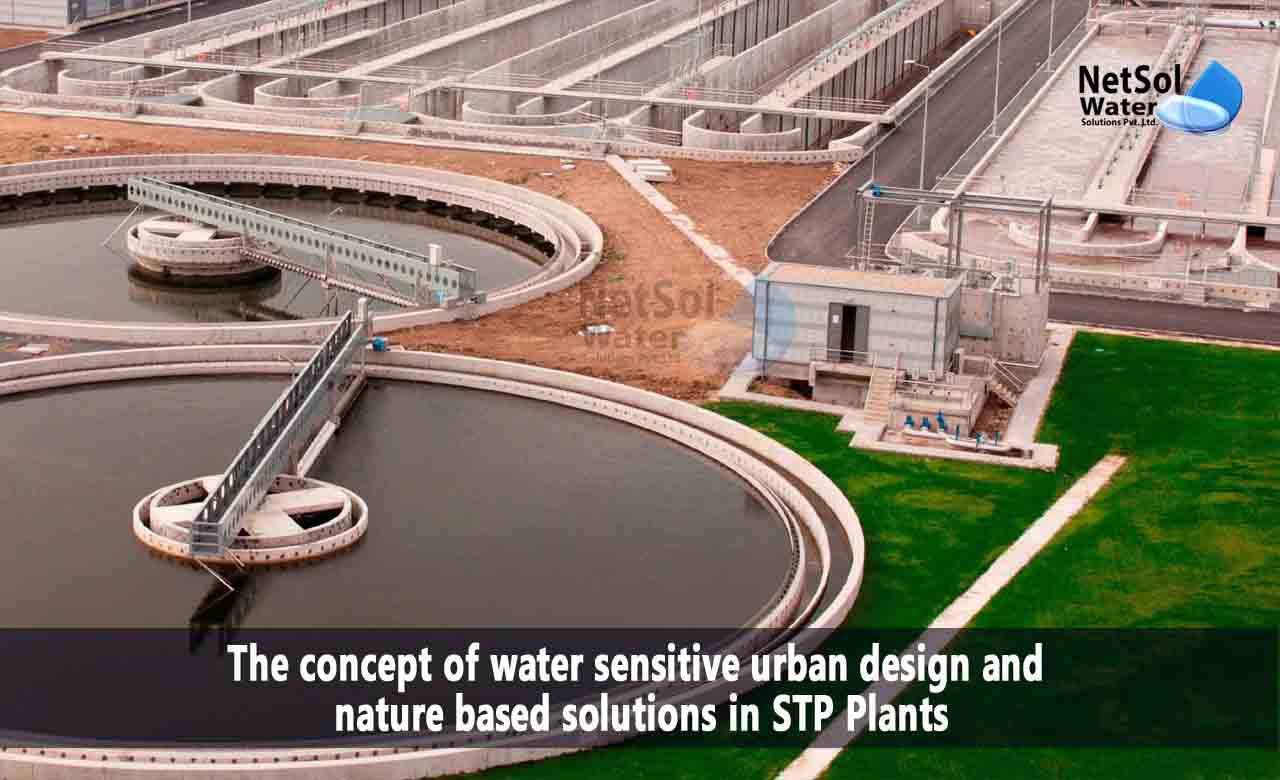The concept of water sensitive urban design in STP Plants
As our cities continue to grow, so does the need for sustainable infrastructure and resource management. One critical aspect of urban planning that often goes unnoticed is the integration of nature-based solutions into the design of sewage treatment plants and water-sensitive urban design. By combining these two approaches, cities can not only effectively treat wastewater but also mitigate environmental impact, improve water quality, and enhance the overall livability of urban areas.
In this blog post, we will explore the concept of water-sensitive urban design and the integration of nature-based solutions in sewage treatment plants, highlighting the benefits they bring to our cities.
Understanding Water-Sensitive Urban Design
Water-sensitive urban design (WSUD) is an innovative approach to urban planning that aims to manage water resources in a sustainable and environmentally friendly manner. Traditional urban development often disregards the natural water cycle, leading to issues such as water scarcity, pollution, and urban flooding. WSUD seeks to address these challenges by imitating and restoring natural processes, integrating green infrastructure, and promoting the efficient use and reuse of water within the urban landscape.
Integrating Nature into Sewage Treatment Plants
Sewage treatment plants play a crucial role in managing and treating wastewater before it is discharged back into the environment. However, conventional treatment plants typically operate as industrial facilities, often hidden from view and disconnected from the surrounding landscape. By incorporating nature-based solutions into the design and operation of these plants, we can transform them into environmentally friendly and aesthetically pleasing assets within the urban fabric.
- Constructed Wetlands: One of the most effective nature-based solutions used in sewage treatment plants is the implementation of constructed wetlands. These wetlands act as natural filtration systems, utilizing wetland plants and microorganisms to remove pollutants and nutrients from wastewater. By integrating constructed wetlands into the treatment process, we can enhance water quality, reduce energy consumption, and create wildlife habitats within the plant's premises.
- Green Roofs and Walls: Another way to integrate nature into sewage treatment plants is through the use of green roofs and walls. These features not only improve the aesthetics of the plant but also provide numerous benefits such as stormwater management, insulation, and air quality improvement. Green roofs and walls help regulate temperature, reduce the heat island effect, and enhance biodiversity, thus creating a more sustainable and pleasant environment for both plant workers and nearby residents.
- Urban Water Reuse: Implementing water reuse systems within sewage treatment plants enables the production of reclaimed water, which can be used for non-potable purposes like irrigation, industrial processes, and toilet flushing. By capturing, treating, and reusing wastewater locally, cities can reduce the strain on freshwater resources and promote a more circular water economy.
Benefits of Integrating Nature into City Planning
The integration of nature-based solutions into sewage treatment plants(STP and ETP manufacturer in Noida) and urban design offers numerous benefits that go beyond efficient wastewater treatment:
- Environmental Sustainability: Nature-based solutions help reduce the environmental impact of sewage treatment plants by enhancing water quality, conserving water resources, and restoring natural ecosystems. They also contribute to carbon sequestration and mitigate the effects of climate change.
- Improved Urban Livability: Integrating nature into urban areas creates more attractive and enjoyable spaces for residents. Green infrastructure in and around sewage treatment plants helps mitigate noise, reduce air pollution, and enhance visual aesthetics, ultimately improving the overall quality of life in cities.
- Biodiversity and Ecosystem Services: By providing habitat for various plant and animal species, nature-based solutions within sewage treatment plants contribute to biodiversity conservation and support the provision of essential ecosystem services. These services include pollination, water purification, flood mitigation, and soil stabilization.
- Education and Awareness: Integrating nature into sewage treatment plants offers opportunities for environmental education and awareness. These facilities can serve as educational hubs, showcasing the importance of sustainable water management, the benefits of nature-based solutions, and inspiring citizens to take action in their own communities.
Conclusion
As we strive for more sustainable and resilient cities, it is crucial to incorporate nature-based solutions into sewage treatment plants and urban design. By integrating constructed wetlands, green roofs, walls, and promoting water reuse, cities can enhance the functionality, efficiency, and environmental performance of sewage treatment plants while simultaneously improving urban livability and biodiversity. Embracing water-sensitive urban design and nature-based solutions represents a paradigm shift towards a more harmonious and sustainable coexistence between urban areas and the natural environment.
Netsol Water is Greater Noida-based leading water & wastewater treatment plant manufacturer. We are industry's most demanding company based on client review and work quality. We are known as best commercial RO plant manufacturers, industrial RO plant manufacturer, sewage treatment plant manufacturer, Water Softener Plant Manufacturers and effluent treatment plant manufacturers. Apart from this 24x7 customer support is our USP. Call on +91-9650608473, or write us at enquiry@netsolwater.com for any support, inquiry or product-purchase related query.



